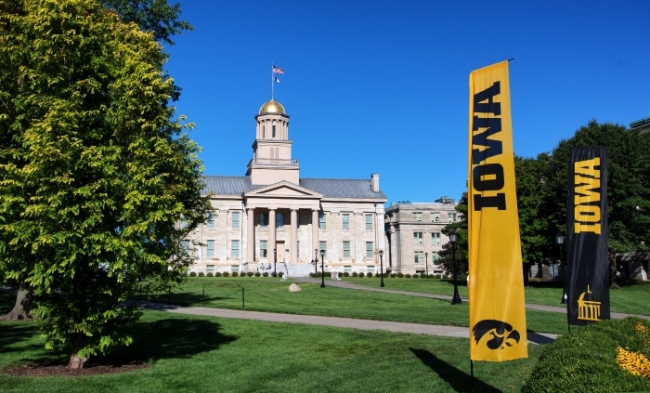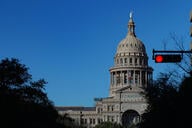You have /5 articles left.
Sign up for a free account or log in.

University of Iowa
A University of Iowa dean apologized to a student for the way he was treated in the fall during a campus debate over former president Trump's executive order banning federal funding for antibias or diversity programs with "divisive concepts."
The Trump order has been blocked by a federal judge and revoked by President Biden.
But the way some Iowa administrators responded to the order continues to reverberate through the campus.
The controversy started when the leadership and faculty members from the dental school sent a mass email to students and faculty members in October that condemned the executive order.
The student, Michael Brase, responded to the email (and to everyone who received it).
"By condemning Executive Order 13950, does the [College of Dentistry] support using federal funds to promote trainings that include race/sex stereotyping and/or race/sex scapegoating?" he wrote. And he asked why the college shouldn't follow the guidelines in the executive order and "continue to provide training that encourages respect and equality for all races/sexes."
A few weeks later, Brase received an email from the college. "It has come to the attention of the Collegiate Academic and Professional Performance Committee (CAPP) your unprofessional behavior involving the follow-up emails you sent out on a public platform after you were offered other means to continue the conversation," the email said.
Brase was ordered to attend a student conduct hearing.
But the university backed down after Brase threatened to go to state legislators with the story. No hearing was held. The threat of a hearing was only in place for two days.
At a legislative hearing this week, David Johnsen, the dean of the school, apologized.
"We do not want any of our students to have an experience that leaves them feeling unsupported or fearful. Yet we have failed Michael in that regard. And to be honest with the committee we have heard from other students, faculty, and staff in our college that we have failed them as well. We as a college must and will do better to support Michael and all of the students, faculty, and staff," said Johnsen (in remarks prepared for delivery).
Johnsen noted that Brase "was never threatened with expulsion, nor did he face academic punishment … That being said I can see why he thought that was a possibility and I am disappointed that our language in the letter led him to fear otherwise and that he felt concerned enough to reach out to legislators before he had a chance to meet with our associate dean for students."
But Johnsen, who signed the original email about the executive order, went beyond the apology to the student.
"Our first step is that moving forward I will not use my voice, in an official capacity, to comment about current political topics," he said. "While I will continue to foster opportunities that encourage debate and dialogue within the college -- I have come to realize that by expressing an opinion, as the dean, on a political topic can chill speech rather than foster free speech."
Republican legislators were not impressed with Johnsen's appearance (although they agreed with the apology).
One of those who spoke at the hearing was Representative Bobby Kaufmann, who was chair of the College Republicans when he was a student at Iowa. He did not respond to a request for comment.
But according to The Des Moines Register, he said, "I can speak to direct testimony from my members who feel, rightly or wrongly … that there's a different set of rules -- one for conservative groups and one for liberal groups. This is a repeated, decade-long -- and probably even longer -- feeling of hundreds of students, if not thousands, that there are two different sets of rules."
Brase, in an email to Inside Higher Ed, said, "I appreciate that he acknowledged the school's actions against me were a failure to protect freedom of speech and that school administrators should not be using their positions to make political statements to their organizations. Only time will tell whether those were simply words spoken while under scrutiny, or if they reflect a genuine desire to foster an environment that encourages the free expression of a variety of opinions. I like to see the good in people, so I am hopeful."
One subtext for the debate at Iowa is a bill to eliminate tenure at the state's universities. Similar bills have failed in the past, but the debate over Trump's executive order has drawn attention to the bill.
“In the real world, if you mess up, and you mess up that bad, you’re fired,” Representative Skyler Wheeler told The Cedar Rapids Gazette. “You get canned. It’s going to be hard to get another job.”
What the Experts Say
Adam Steinbaugh, director of the Foundation for Individual Rights in Education's Individual Rights Defense Program, linked the way Iowa treated Brase to the fact that the dean had spoken out on a public policy question.
"When university leaders open up campus discussions about political issues like the executive order, which FIRE criticized because of its potential threat to chill academic speech, they should not take steps to limit that discussion," Steinbaugh said. "Unfortunately, we've too often seen 'professionalism' used as a pretext to investigate, discipline or chill student speech on matters of public concern. Even if a student is not ultimately punished, summoning a student to a disciplinary hearing may have continuing consequences … It also sends students the message that administrators can end their careers for participating in discussion about public policy."
The American Association of University Professors declined to comment because its standards concern faculty members, not administrators.




